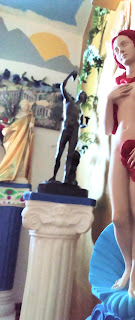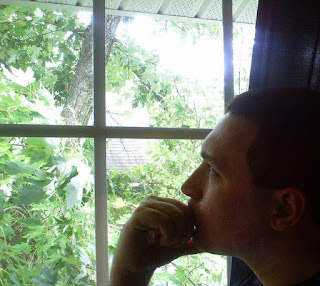Why do bad things happen to me if there are Gods who care?
It's one of the oldest questions in the book, even asked by some Hellenists today who are having a difficult time with life. I by no means pretend to have the answers to life and the universe. Sometimes, the wisest thing you can say is, "I don't know." But in my own life, I have had no shortage of bad or seemingly bad experiences and tough times throughout all of my years on this Earth.
I was born into poverty, physically and mentally abused growing up, bullied in school, failed grades, lost several close relationships, lost jobs, worked ones I despised, lost my vehicles, had a son born severely premature, and ended up losing everything I had ever known living in North Carolina all together when my home was taken from my family and I left the state to pursue a better life. For years, I also suffered from severe depression and anxiety disorder. Only recently have I found medication and therapy that have quelled the issues. So do not take me for someone who has had a good life and is trying to tell others in bad situations that life's not so bad. I'm not the born-billionaire telling the trailer park that they can make it if they try. Believe me, I have had no easy life. Quite likely, I understand what you're going through.
But I also still sincerely believe in and love the Gods. No matter how hard things have gotten, I have never cursed or turned on them. Ever. And what I've noticed is that things progressively improved for me because I am always inviting in the blessed presence of the Gods. We don't worship the Gods because they need or demand it. We don't do it to satisfy them. They can get along perfectly fine without us. We connect with the Gods to bring bliss into our lives. The more we do things to take ourselves out of the presence of the Gods, the worse things get. I know this also from personal experience. As I have said before, I used to be an extremely negative and angry person, and bad things kept happening to me left and right, because that negativity and hate was keeping me out of the presence of the Gods who are always positive and joyous.
When looking at our lives, I think the first question we have to ask ourselves is, What is bad? Often, what we may perceive as bad or a struggle is actually working out for a greater good. It can be impossible to see at times, but it may indeed be the case. When I left North Carolina, for years I thought I had made the worst mistake of my life. And indeed, I asked the Gods, Why did you let this happen to me? But now, the reality of my family's situation has been made clear. If we had remained where we were, my son and our family would have greatly suffered financially and in the educational system. North Carolina jobs don't pay as well, there's basically no protection for workers and minorities, and healthcare access can be a stand-up comedy. The educational system also wouldn't have worked as well with my son's special needs. Living in Illinois has brought us a great deal of help and opportunity that we would have otherwise probably not had. So while my situation for many years seemed like a terrible disaster, it was actually for the best that we went through that journey.
Speaking of journeys brings me to my next discussion on the matter, purpose. Aristotle said that nature does nothing without need, and the Gods control nature. Therefore, we can also say that the Gods do nothing without need. In giving us life, they gave it for a reason. In our struggles as well as our triumphs, we find meaning, purpose and wisdom in life. If the Gods just gave us every single thing and didn't allow us to actually strive and experience, there would be no purpose to human life, and thus, we ourselves would have no purpose. The things we experience in life are part of that journey and that purpose. It's like when we go through schooling. Some classes are easy, others are very hard, but they all teach us what we need to know, and we are the better for it. My experiences in life have helped me understand what it means to be poor, to feel empathy for people who are abused and mistreated, to seize opportunity, and to be grateful for the things I have instead of squandering them. Had I grown up rich and privileged, there's no way I could have possibly understood those struggles or the people who go through them. It has actually made me wiser and more humane.
As humans, we are very reactive creatures, and we're so quick to categorize things into joy and sorrow, success and failure, or good and bad. Because it's so easy for us to seek the extremes of something. And we are so quick to assume that the Gods don't care about us even at the slightest sign of trouble. I don't believe any evil comes from the Gods. Democritus said that the Gods give all good things. They are the ultimate good in the universe, the order against the chaos, and in some cases, that battle still rages today. That's why we invoke the Gods in our times of need, because we understand that any evil or harm that is happening to us, isn't coming from them. Deep down, we know that, and we know we have seen them answer us in the past. I certainly have. My son is alive today because the Gods cared. Otherwise, we wouldn't pray to them for rescue, and the more we bring that ultimate goodness into our lives, I can say from experience, the better chance we have of life getting better.
Pray to them every day, and delight in all the beautiful things around you that they have given. When you learn to look, you will see the love of the Gods. You will see it in the bright sunshine on your face, the fresh breeze in the air, the soft grass beneath your feet, the beautiful smell of the flowers, the shimmering fields and towering forests, the peaceful flow of the passing streams and rivers, the children playing happily, and the friends and family who dearly love you. This part of life can be hard, but the Gods are not against you. If they were, you wouldn't be here. And if you choose to live a life where you hate the Gods, or where you serve them one day and spit on their statues the second something doesn't go your way, you're never going to experience their full goodness in your life. And if you choose to always look at the bad side of things instead of finding good and the inherent purpose of all that comes to you, you'll never be happy or successful.
In the Goodness of the Gods,
Chris.













